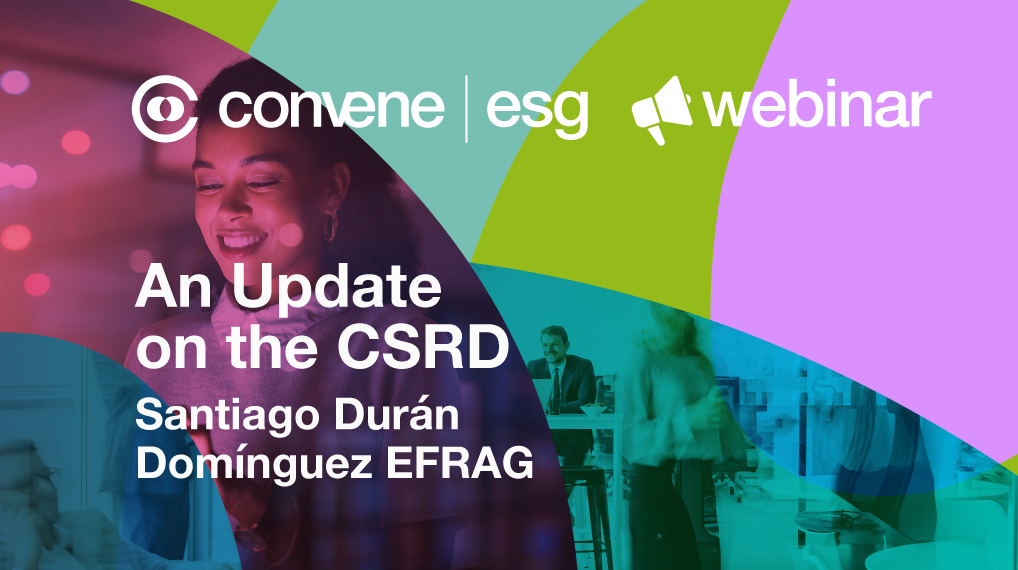In recent years, organisations have been focused on embedding sustainability into their operations. Numerous companies are restructuring their business strategies, reorganising their corporate frameworks, and investing significant resources to incorporate ESG into their objectives.
Many have come to see ESG reporting as not just a regulatory burden, but a critical part of running an organisation, and appealing to investors.
Reporting ESG performance in ESG reports is the way to demonstrate this, to investors and stakeholders alike. They have become a crucial way for organisation to show their dedication to the implementation of ESG, and are slowly becoming much more commonplace and in some sectors mandatory.
But, what even is an ESG report?
Lottie Wright
Recent posts by Lottie Wright
7 min read
What is an ESG Report?
By Lottie Wright on 20/06/24 11:00
Topics: Governance Sustainability ESG
6 min read
What is the ESRS?
By Lottie Wright on 18/06/24 16:00
With the implementation of the Corporate Sustainability Reporting Directive (CSRD) in January 2024, the adoption of the European Sustainability Reporting Standards (ESRS) has become mandatory for companies within its scope. This marks a significant step towards standardised non-financial reporting across Europe.
Topics: Governance ESG Frameworks
3 min read
Convene Sponsors the 2024 CGI ESG Summit
By Lottie Wright on 14/05/24 14:09
On Thursday 2nd May, Convene sponsored the 2024 CGI ESG Summit. We’d like to thank the Chartered Governance Institute for such an engaging conference, and all attendees for their enthusiastic participation.
The summit was a chance to connect with industry professionals and discuss the recent developments in the fast-paced ESG landscape. As more organisations begin to incorporate ESG into their agenda, goals and objectives, understanding both ESG risks and its opportunities is crucial.
This summit focused on these ESG risks, on the increasing regulatory and market demands and what your organisation needs to do to capitalise on this momentum. It provided attendees with the latest thinking on ESG regulation, legislation and best practice for UK companies and subsidiaries.
It started with a Keynote on ‘anti-ESG’ backlash, and how companies and their investors can move forward when facing this. This was followed by a debate by ESG experts on the challenges of how to prioritise different aspects of ESG alongside company and stakeholder interests.
There was then a talk on the role of the sustainability committee, discussing what works and what doesn’t when setting up board-level sustainability committees.
This was then followed by an ESG regulation and reporting update, exploring the evolving landscape and what critical deadlines Boards should focus on amongst all of this new legislation.
There was also a panel on top tips for getting ESG reporting right, which discussed the potential issues when gathering reliable ESG data.
This is where Convene ESG comes in as a sponsor of the summit.
Convene ESG allows you to simplify your ESG reporting by providing a platform to collect data, track progress, align with frameworks and produce reports.
Our end-to-end approach simplifies and automates much of the process, and will help your organisation not only generate a report, but be able set up and track your ESG goals. Our peer comparison feature also allows you to see which disclosure items your peers have reported on, as well as the best-practice recommendations for your industry.
With Convene ESG, you can be sure that your ESG report building runs smoothly, so you can instead focus on developing your sustainable strategies.
After a break for lunch, there was a session that looked at managing ESG risks and what a Director’s duties and liabilities can be.
This was followed by a panel on Boardroom diversity, exploring the new frontiers for Board diversity and discussing how companies can continue to make their boards more diverse.
There was then a panel about ESG engagement with investors, which saw investors discussing the future of ESG from their perspective and what role ESG plays in investment decisions.
Finally, the day ended with a session that enabled attendees to identify the skill gaps in their Boardroom, and apply their ESG knowledge in practice. This looked at ‘plugging the ESG competency gap’, and helping organisations on all levels understand the importance of ESG.
The summit explored the evolving world of ESG, and helped organisations understand the sometimes overwhelming ‘alphabet soup’ of ESG legislation.
We’d like to again thank the CGI for putting on such a thought-provoking conference, as well as all those in attendance for their enlightening discussions on the developing landscape of ESG.
You can learn more about how Convene ESG can help your organisation in navigating this landscape and its regulations here.
Topics: Sustainability ESG
2 min read
Demystifying ESG in the EU - Webinar
By Lottie Wright on 17/04/24 10:56
On the 16th April 2024, Convene hosted our second webinar in our Convene ESG series, which focused on ‘Demystifying ESG in the EU’.
The webinar featured Professor Laura Corazza, a Senior Researcher of Sustainability Accounting and Accountability at the University of Turin. In her talk and presentation she explained the new EU CSRD Regulations, before going through some practical tips on how companies can start embracing ESG principles.
Laura Corazzo first spoke about the ESG regulatory landscape, and how disclosures have transformed over the years. She looked at the international reporting landscape specifically, and explained the difference between standards and frameworks.
Laura discussed the European strategy towards sustainability with the European Green Deal, and highlighted the targets, time frames and actions of said deal.
Then Laura explored how the European ESG landscape has been transforming in recent years, starting with the European Taxonomy and its objectives. She spoke about the changes occurring to global economies including the implementation of the CSRD, the DNSH principle and the CSDDD.
She then gave some background information surrounding the CSRD, and the differences between the previous NFRD legislation and the current CSRD. The CSRD has far more detail in regards to the data that companies need to provide in their reporting.
Laura then introduced the CSRD timeline and phased implementation, noting that from January 1st 2024 reporting requirements apply to the first group of affected companies, with their reports being published in 2025. She ended the talk discussing double materiality and its logic.
To download the slides from Laura's talk, click here. Or scroll below to watch Laura's talk.
Topics: Sustainability ESG Frameworks Webinars
7 min read
Governance Issues affecting Charities in Financial Year 2025
By Lottie Wright on 04/04/24 15:50
With an uncertain year ahead, and a continuing cost of living crisis, this financial year for charities and non profits will be even more impactful. Understanding burgeoning governance issues in the sector is one way charities can prepare themselves for the year ahead.
Topics: Governance Charity Business Insights
4 min read
Convene at the Housing Finance Conference and Exhibition 2024
By Lottie Wright on 15/03/24 14:34
On the 13th and 14th March, Convene attended the Housing Finance Conference and Exhibition 2024 as a Knowledge Partner and Exhibitor with Convene ESG. We’d like to thank the National Housing Federation (NHF) for setting up such a thought-provoking conference, and for all those in attendance for their engagement.
The conference provided the space for finance professionals in the Housing sector to discuss some of the sector’s most pressing issues. This year is especially crucial for these discussions, and so the conference was an opportunity for Housing Associations to “take stock before the financial year end and a General Election”, which could lead to substantial consequences for the sector.
The conference allowed financial leadership to join peers, key stakeholders and experts in discussions surrounding the current economic landscape, as well as share concerns and introduce new insights so that Housing Associations can deliver the best possible service for their residents.
The first day of the conference started with a talk about the ‘big economic picture’ for Housing associations. This was followed by a talk on business planning in the sector, and whether these plans are a sustainable strategy or a short-term fix.
Then there were the morning breakout sessions, which looked at such topics as business planning and risk management, social impact data reporting, the upcoming trajectory of funding and Housing market updates.
The next breakout sessions looked at issues such as net zero and its economic benefits and redefining the role of the finance team. There was also a financial masterclass on market conditions for pension schemes and a roundtable discussion on how smaller Housing Associations can work together to improve finances.
After lunch, there was a talk on the government’s road to scaling up retrofit, with insights from Selvin Brown. Then there were more breakout sessions.
In the first of the breakout sessions there were talks on the insurer’s view of the evolution of risk in the sector, the future of AI in Housing finance, how to fund your retrofit project, and a Valuations update for the Housing Market. There were also discussions on what the new regulations mean for social housing providers, a financial masterclass on the changes to Financial Reporting Standards and SORP and a talk on business transformation.
The second of the sessions for the afternoon looked at topics such as the lessons learned from mergers, the role of digital in Housing finance, the role of profits and investment in pushing the developmental agenda, and building sustainable partnerships with funders. There was another financial masterclass in conversation with HMRC, a talk about elevating the workplace and discussions on V2 and what the ‘new normal’ actually means.
There was a final talk on navigating sector pressures whilst maintaining credit profiles. Then there was a keynote event to finish off the day, which discussed where tech could possibly take the sector.
The second day of the conference started talks about plans for public spending and tax on the sector with the Spring Budget, and how to finance a long-term plan for Social Housing. This was followed by talk by Clive Betts MP, which was an update on the inquiry into the finances and sustainability of the Social Housing sector.
There was another talk on the changes to the Affordable Homes Guarantee Scheme, before more breakout sessions began. The first breakout sessions discussed balancing competing priorities in an uncertain market, repairs and maintenance in digital data, and enabling the regeneration rollout.
There was also a discussion on the impact the new Sustainability Reporting Standard for Social Housing could have on securing borrowing. This talk features Convene’s own Arturo Dell, who spoke about green finance and the importance of creating a corporate culture where reporting is a priority.
He also spoke about Convene’s own reporting software Convene ESG, and how it can help Housing Associations with their reporting and the prioritisation of said reporting.
Convene ESG allows you to develop your ESG story by streamlining the administrative process of ESG reporting giving you time to focus on bigger goals and future visions.
Through data collection, peer comparison, and report generation, you are able to monitor your progress, achieve your targets and exhibit your success - creating a company which values ESG and makes a positive difference to the world whilst ensuring you meet regulatory requirements, industry standards and shareholder expectations.
The next breakout sessions looked at the future of rent policy for the sector, navigating volatility in treasury management, the role of leadership in finance business transformation and had a ‘meet the finance leaders’ talk.
After lunch there was a talk on VAT savings on procurement through the cost sharing exemption. This was then followed by a final set of breakout sessions.
These focused on optimising risk management, the long-term value of investing in cybersecurity, identifying viable models to generate new income, and stock quality and operational costs. There was also a discussion of the cost of living crisis, and whether we are ‘out of the woods yet’.
The day ended with a talk measuring the impact of Britain’s economic storm on residents, and looking at the future of Housing finance.
We’d like to again thank the National Housing Federation for giving Convene ESG the opportunity to exhibit at and be a knowledge partner for the Housing Finance Conference and Exhibition 2024. We’d also like to thank all attendees for your engaging discussions and participation in the conference’s exploration of the current state of finance in the Social Housing sector.
Topics: ESG Housing
2 min read
An Update on the CSRD with Santiago Durán Domínguez - Webinar
By Lottie Wright on 15/03/24 09:46
On the 12th March, Convene hosted the first webinar in our Convene ESG series, explaining updates on ESG matters in the EU.
This webinar discussed an update on the CSRD, with Santiago Durán Domínguez from EFRAG. The CSRD, or Corporate Sustainability Reporting Directive, is the new EU legislation requiring companies to release regular reports on their ESG efforts.
First, the webinar started with a demo on reporting for the CSRD with Convene ESG, Convene’s own ESG reporting software. Convene ESG is an end-to-end platform to collect data, track progress, compare with peers, align with frameworks and produce ESG reports. With Convene ESG, you can collect your data for all the necessary metrics in the upcoming CSRD legislation, ensuring that you are compliant with regulations.
Then, Santiago Durán Domínguez was introduced to talk about the update to the CSRD. He discussed the sustainability information organisations should know about, and the current areas of regulatory developments; taxonomy, tools for companies and disclosure regimes.
He discussed the relevant aspects of the CSRD, and stressed the importance of the CSRD as a way for companies to all report according to European standards.
Santiago Durán Domínguez also went through the three categories of standards for the CSRD, and discussed the relevant issues of double materiality, due diligence, interoperability with other international frameworks and value chain.
He then spoke about the role of EFRAG in all of this, and the current issues of verification with the CSRD, which will instead have limited assurance until 2028. There was then a brief Q&A at the end of the session.
To download the slides from Santiago's talk, click here. Or scroll below to watch Santiago's talk.
If you enjoyed this webinar or want to catch the next one, our upcoming topic will be ‘Demystifying ESG in the EU’ on April 9th.
Thank you to all for those who attended, and to Santiago Durán Domínguez for his insights into the CSRD.
Topics: Sustainability ESG Frameworks
8 min read
Governance Issues affecting Housing in financial year 2025
By Lottie Wright on 01/03/24 14:51
Amongst unclear legislation and a cost of living crisis, Housing Associations need to be on top of their governance now more than ever. There are several governance issues that the sector needs to be prepared for, heading into the financial year 2025.
As said by the National Housing Federation, “Governance is the framework at the heart of a successful housing association. It sets standards of leadership and control and helps the board to define values by which the organisation will operate”.
First, it’s important to define governance, so we can label what exactly governance issues could be that could affect housing.
What is Governance, and what are Governance Issues?
Governance comprises all aspects of leadership and decision-making. It is the structures in place that allow a leader in any organised body to rule or control or dictate actions.
Corporate governance is the system a company chooses to put in place concerning rules, controls and policies to enforce a standard of behaviour.
Governance issues are therefore anything that could impact an organisation's ability to achieve good and effective governance, as well as the aspects of governance that companies and leadership teams need to be on top of this coming year.
Topics: Governance Housing
3 min read
Convene sponsors the 2024 ESG and Sustainability Reporting Conference
By Lottie Wright on 07/02/24 13:48
On Tuesday 6th February 2024, Convene sponsored the ESG and Sustainability Reporting Conference in London. We’d like to thank Westminster Insight as well as all speakers and attendees for putting on such an engaging conference.
Topics: Sustainability ESG
7 min read
Does your organisation need a CSO?
By Lottie Wright on 01/02/24 11:00
When sustainability is discussed, ESG specialists usually emphasise the significance of having a committed individual responsible for overseeing initiatives. This can help to maintain and enhance sustainability across the entire organisation.
Linda Fisher was the first person to receive the title of “Chief Sustainability Officer” in 2004, when she was hired by DuPont. Following this, there has been a surge of similar positions cropping up at major companies. As of 2021 the number of CSOs worldwide has tripled, in comparison to 2016.
The duties of the CSO position have continued to evolve with the ever-changing ESG landscape. But the question is: what exactly is the role of a Chief Sustainability Officer and does your organisation need one?
The Role of the CSO
There still seems to be a lack of clarity surrounding the role of the CSO. Having a CSO doesn’t immediately guarantee company-wide sustainability. Sustainability cannot be left to just one person, or confined to one area of an organisation. It needs to be integrated throughout all levels of a company.
The role of a CSO includes overseeing risk, fostering resilience, and guiding the behaviour of stakeholders: employees, businesses, investors, governments, and regulators.
A CSO is responsible for a company’s environmental impact, resources and plans. Although environmental issues are critical to the role, there is a growing number of CSOs who are bringing the S and G aspects of ESG into the role too.
The scope of the CSOs responsibilities differs greatly across industries and organisations, depending on their significant social and environmental influence. However, their general function is to analyse potential changes in the external sustainability landscape, then assess the strategic implications for their company. They then need to help ensure that their company fulfils its environmental, social, and governance commitments.
The Responsibilities of the CSO
The specific responsibilities the CSO has in managing an organisation’s ESG and sustainability goals can include:
Ensuring regulatory compliance.
Topics: Governance Sustainability ESG Business Insights
8 min read
Ways to increase your Board's Long-Term Impact
By Lottie Wright on 23/01/24 14:00
Establishing an effective Board is one thing, but maintaining that effectiveness in the long-term is another factor altogether. Ineffective Boards can have disastrous consequences for an organisation, impacting the success and longevity of a company.
These times demand more from the Board. The last few years have been tumultuous and unpredictable, with the COVID-19 pandemic and cost of living crisis. This has hindered the Board’s ability to plan for the long-term.
But it is still important to focus on the future, even in the face of uncertainty. Convene is here to help demonstrate the ways your Board can effectively secure your organisation's long-term success.
1. Improve Board relations, communication and culture.
Making boards more resilient and effective means creating a cultural space where directors can scrutinise, challenge and debate. This requires the recruitment of a diverse Board, as well as getting the right Board structure and culture. When a Board and its members can work efficiently together, it increases their effectiveness in the long-term.
Board Members, now more than ever, are involved with strategy, technology, IT, cybersecurity and other issues. They are also spending more time with management than ever before.
The most effective Boards go beyond their duties in the meeting room. They encourage a close partnership with their senior management team to create forward-thinking objectives, set goals for performance, and strengthen responsibility through open communications. Nowadays, Boards depend on management to guarantee the implementation of their strategies, and they monitor progress to stay informed.
Creating a Board that combines Board culture and relations with its objectives for attaining long-term value, will lead to the formation of an effective executive team.
2. Appoint an effective Chair for your Board.
Another way to improve Board relations and effectiveness is by appointing a chair who can facilitate this.
Effective Board leadership makes an effective Board. Board meetings can be stressful, particularly in times of economic downturn or crisis, when the stakes are high. The Board chair plays a crucial role in ensuring meetings run smoothly, and achieve what they set out to achieve.
The chair must have a clear agenda that balances both strategic and fiduciary topics. They need to be able to encourage Board members to voice their opinions, and understand different perspectives while maintaining a clear vision of what needs to be done.
To enhance Board effectiveness, Boards need to be led by someone who can think of both the short-term and long-term goals of the Board, and consider this in all decision-making and discussion.
3. Implement, and then act on Board evaluations.
High-value Boards are now expected to do more than just provide strategic advice. They are now also required to actively work towards continuous improvement. These Boards must regularly evaluate their performance and make an effort to operate in a productive and effective manner.
A Board’s performance can vary over time and is dependent on many factors, such as Board composition, Chair leadership, and the life cycle of the organisation. It therefore needs consistent analysis.
Boards should conduct in-depth evaluation of their overall performance at least once per year, and add to this effort by holding regular feedback sessions after meetings.
Boards shouldn’t see this annual performance evaluation as a ‘box-ticking’ or ‘fill-out-the-template’ activity. Board evaluations need to facilitate a more thoughtful reflection of both individual and team performance, measuring this against specific goals.
High quality feedback, in both feedback sessions and overall evaluations , helps Boards and their directors recognise their areas for improvement.
A Board evaluation can be an extremely effective measure in determining whether a Board’s composition, structure and dynamics actually serve the organisation in both the short and long-term. The evaluation of the Board’s operations helps ensure it is running as effectively as possible, and maintaining longevity.
4. Invest in onboarding.
No matter a new Board member’s background or experience, it takes time to get used to an organisation’s strategy and culture. Especially with how Board operations can differ company to company.
Investing in thorough Board onboarding processes helps new Board members to establish themselves easily, so they can begin to make effective contributions and feel like a part of the Board.
Tailored onboarding practices towards both Board members and directors can help ensure all can participate in effective governance for the Board sooner, rather than later.
Effective Boards are those that take initiative, dedicate time to building relationships, and strive for constant improvement. By embracing these strategies, Boards can tap into their full potential and make a lasting impact on their organisation's ability to adapt and grow.
5. Factor in new and emerging trends.
Many Boards believe that they excel in providing value in conventional aspects like managing finances, monitoring risks, and enhancing productivity.
But as the last few years have taught us, Boards need to be not only capable in those sectors, but also be prepared to tackle emerging key issues such as cybersecurity and ESG.
To ensure Boards are successful in the long term they need to be not only sufficient in preparation, but also in analysing and adapting to surfacing trends. New risks in industries and sectors will require Board input, and it is crucial that Boards are prepared to not just continue on one course, but change for the future.
To create a lasting effect, it is crucial for the Board to readjust its usual priorities and consider new, long-term trends that contribute to value. These factors should be included in Board meeting agendas.
As the Board is primarily responsible for strategic supervision, Board members must possess adequate expertise in industry trends to effectively steer the company's long-term strategy.
6. Improve Board meetings and information sharing.
Boards need their meetings to run smoothly, and they need systems and software that facilitates this. Without access to relevant information easily, Boards cannot effectively administer their duties.
Board portals are a highly-secure, online, centralised hub that can help you do just that.
Board portals facilitate a secured environment for sharing confidential documents and information. It enables Boards to exercise good corporate governance and decision-making responsibilities despite working in remote workplaces.
Convene’s own Board portal software can help your leadership team to communicate effectively and ensure your long-term success.
Convene provides directors and administrators with the necessary communication and collaboration tools that simplify Board material preparation, reports, and Board document sharing, among many other meeting-related tasks.
From creating an agenda to establishing a strong admin trail, every step of the process should be as smooth as possible. With a Board portal like Convene at your side, you can instead focus on making your Board maintain its effectiveness in the long-term, without having to sweat the small stuff.
How Convene can help you Board
Convene’s Award Winning Board portal software allows your Board to communicate efficiently and run meetings with ease, maintaining an effective environment for your Board.
Convene now comes fully integrated with Microsoft Teams, ensuring that the meeting process is even more seamless for your organisation, and improving Board effectiveness.
Our Board portal features include:
Topics: Governance Business Insights
6 min read
ESG Trends in 2024
By Lottie Wright on 15/12/23 15:25
As ESG practices and disclosures become crucial to a companies' public image, their investors and their overall success, 2024 looks to be a year of even further regulations and a ramping up of ESG policies.
Now, more than ever, it is important for organisations to prepare for ESG in 2024, and understand the trends we could be seeing in the future sustainability landscape.
But first, what was ESG like in 2023?
ESG in 2023
In 2023, organisations all over the world faced a turbulent landscape marked by a cost of living crisis, inflation, supply chain disruptions, and recessions fears. Amid this uncertainty, Environmental, Social and Governance practices became even more crucial for companies to undertake.
2023 was a turning point for ESG and emphasised the need for proactive ESG initiatives. ESG trends have been around for the past few years but there were some clear trends in 2023 that are important to remember going into 2024.
Sustainable Finance: Companies focusing on both financial revenue and the environment in their investments has gained momentum in the last year.
Supply Chain Resilience: There was a significant focus on supply chain resilience as an ESG trend. This was emphasised by the need to develop a supply chain that can maintain its efficiency in times of crisis, for example in a global pandemic.
Transparency and Ethical Practices: In order to steer clear of greenwashing accusations companies are putting in more effort to promote transparency and prioritise ethical business and governance practices.
The ESG landscape is continuing to evolve. With ESG maintaining its priority on the agenda, it is important for organisations to understand what is in store for the future of ESG, and what trends might be seen in 2024.
ESG Trends in 2024
Heading into 2024, there are both old and new ESG trends to be mindful of, especially for companies seeking to implement greater sustainability.
It is already shaping up to be a watermark year for ESG regulation with years of preparation finally ramping into action. This is particularly true in the EU, where the emphasis is now shifting to implementation after the introduction of numerous regulations over the last three years.
Here are the top trends to watch out for in 2024.
Topics: Sustainability ESG Business Insights
2 min read
Convene's 2023
By Lottie Wright on 15/12/23 09:00
2023 has been another expansive, exciting and successful year here at Convene.
Our team has been kept busy with many interesting conferences this year, and we’ve had a wonderful time travelling the country to meet you all and bring Convene and our new product Convene ESG to you in-person.
We also continued our ESG Webinar series for Housing Associations, and have had some enlightening and important discussions surrounding reporting in the Housing sector, and the introduction of SRS Version 2.0.
Convene also hosted several Housing networking events, furthering discussions on sustainability within the sector and showcasing our own dedication to ESG with our reporting tool Convene ESG.
Convene ESG has gone through some developments and improvements this year, both to its interface and its reporting capabilities. We announced our collaboration with RITTERWALD’s Certified Sustainable Housing Label, allowing Housing Associations to export multiple ESG reports at the touch of a button including RITTERWALD, the SRS and the TCFD.
Additionally, for the fifth year running, Convene sponsored Herne Hill Velodrome Track League 2023 with Convene ESG.
Here at Convene, it is important to us that we maintain our eco mission and green philosophy. We are a paperless company dedicated to helping other organisations develop their sustainability goals, and Convene ESG is just one of our products that achieves this.
Sponsoring Track League is a chance for us to demonstrate further our commitment to sustainability, as well as support a community space that so many people enjoy.
Finally, in July, Convene announced the release of Convene Version 7.0 with newly improved and state-of-the-art board portal features. These features include: comprehensive and customizable dashboards, secure digital signatures, one-click attendance confirmation, seamless meeting publication online and the ability to plan the annual board agenda in one dashboard.
In addition to these exciting new features, Convene 7.0 enhances the existing meeting capabilities, including video meetings, annotations, voting, document management, and integrations, to provide users with a seamless and intelligent experience.
Convene would like to thank you all for your continued efforts in good governance, sustainability and Board excellence, and we wish you a prosperous 2024.
Topics: Governance Community ESG
3 min read
Webinar: Convene ESG & The Good Economy
By Lottie Wright on 05/12/23 14:26
Today we hosted our final webinar in our SRS for Social Housing series for this year. This webinar focused on SRS Version 2.0, and we were joined by Andy Smith from The Good Economy to help us get up to speed on this update.
Here is a brief summary of the discussions.
Topics: SRS for Social Housing
6 min read
What to Prepare for 2024: Housing ESG
By Lottie Wright on 01/12/23 10:30
With the increasing focus on ESG in recent years, it's important to feel prepared for what this changing landscape can bring in the future.
For Housing Associations, the Prime Minister’s announcement of a policy overhaul on plans to help cut carbon emissions left the sector in limbo, and the recent appointment of a new housing minister, the 7th since the beginning of 2022, means that regaining a sense of stability is more critical than ever.
Staying ahead of trends, pushing ESG discussions forward and focusing on developing an effective reporting cycle will be crucial in helping Housing Associations feel secure in the face of future uncertainty.
Housing Associations need to be on top of their ESG reporting, and this includes choosing the right framework and solutions for your organisation.

















